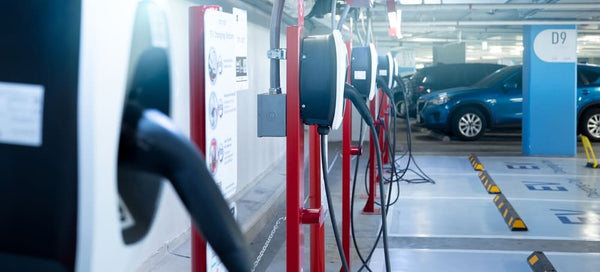
Commercial Charger Payment Tariffs & Solutions
There is a growing demand for the new automotive technology, from competition between manufacturers heating up to government incentives pushing the sale of EVs.
It’s no secret that the popularity of electric vehicles has exploded over recent years. But how do businesses adapt to the new technology by providing commercial EV chargers whilst balancing electric vehicle charging tariffs?
At Volta EV, we are constantly at the forefront of the changing landscape of electric vehicles and EV charging tariffs. Take a look at our comprehensive breakdown of commercial EV tariff costs and how your business can accommodate EV drivers without hurting the bottom line…
Understanding Commercial EV Charging Tariffs
Commercial EV charging tariffs are the pricing structures businesses use to charge electric vehicle users for accessing their charging infrastructure. These tariffs vary widely and can be influenced by location, power output, and peak/off-peak pricing factors.
Time-of-Use (ToU) EV Tariff
ToU tariffs allow businesses to save money by charging electric vehicles during off-peak hours when electricity is typically cheaper.
With ToU tariffs, electricity rates vary throughout the day, with higher rates during peak demand periods and lower rates during off-peak periods. Businesses can significantly reduce their energy costs by strategically scheduling charging sessions during off-peak times.
Fixed-Price EV Tariff
Fixed-price tariffs provide a predictable and consistent cost per kilowatt-hour (kWh) of electricity, regardless of the time of day or day of the week.
This can be beneficial for businesses with consistent charging needs, as it eliminates the need to track and manage fluctuations in energy prices. However, fixed-price tariffs may offer a different cost-saving potential than ToU tariffs, especially if electricity prices are volatile.
Pay-per-use EV Tarrif
Pay-per-use tariffs allow businesses to charge users based on the amount of electricity consumed. This model suits public charging locations or businesses with frequent visitor or employee charging needs, as pay-per-use tariffs can ensure fair billing and revenue generation by charging users for the exact amount of energy used.

Find an eV charging tariff that suits your business or company
Optimising EV Charging Tariffs Across Commercial Charging Infrastructure
Whether you want to maximise profit from your car parking facilities or simply provide additional benefits for employees and customers, balancing the benefits of these facilities with the EV charging tariffs can be difficult.
To maximise the benefits, it’s important to evaluate the anticipated and potential growth in demand to invest in the correct number of EV chargers. Once determined, businesses must ensure compatibility with various EV models and charging standards alongside a balanced power supply.
The choice of tariff structure significantly impacts the economics of EV charging. Time-of-use (ToU) tariffs can encourage off-peak charging to reduce energy costs, and dynamic pricing can adjust rates based on real-time demand and grid conditions.
Fixed-price tariffs offer simplicity and predictability, while pay-per-use tariffs provide flexibility and the potential for higher revenue.
Once these factors have been decided, payment methods, security and access control, and data analytics must be implemented and proactively maintained to minimise downtime and ensure optimal performance.
Paid vs. Free Charging Models: Which is Right for Your Business?
Different EV charging tariffs carry various pros and cons, some more suitable than others, depending on your needs.
Paid models work by charging users for electricity consumption, allowing businesses to recover the initial investment in charging infrastructure and generate additional revenue.
Over time, these profits can fund future expansion or upgrades while simultaneously minimising unnecessary energy consumption thanks to more responsible usage motivated by the user's cost.
However, it's important to consider the potential impact on employee morale or customer satisfaction, especially if the fees are perceived as excessive.
Free charging models can be a worthy investment for a business, as they are a particularly valuable way to attract footfall. They are also a fantastic way to demonstrate an environmentally friendly company, but the higher electricity costs and risk of abuse of the charging infrastructure must be considered.
5 Reasons Why Your Business Needs EV Charging Stations
As the world shifts towards sustainable practices, businesses play a significant role in driving the adoption of electric vehicles. Companies can reap many benefits by investing in EV charging infrastructure and carefully choosing EV charging tariffs, including:
1. Environmental Responsibility:
-
Reduced Carbon Footprint: Contribute to a cleaner and more sustainable future by reducing greenhouse gas emissions.
-
Enhanced Corporate Social Responsibility: Demonstrate a commitment to environmental stewardship and social responsibility, enhancing your brand reputation.
2. Attracting and Retaining Customers
-
Customer Convenience: Attract environmentally conscious customers who value convenience and sustainability.
-
Increased Foot Traffic: Draw in customers who may spend more time on-site, boosting sales and revenue.
3. Improving Employee Satisfaction and Productivity
-
Enhanced Employee Morale: Offer a valuable perk that improves employee satisfaction and loyalty.
-
Reduced Commute Costs: Help employees save money on fuel costs, increasing job satisfaction and productivity.
4. Future-Proofing Business Operations:
-
Adapting to Changing Market Trends: Position your business for the future by meeting the growing demand for EV charging.
-
Potential Revenue Streams: Generate additional revenue through charging fees or partnerships with charging providers.
5. Compliance with Government Regulations:
-
Financial Incentives: Take advantage of government incentives and subsidies to offset the cost of installation.
-
Regulatory Compliance: Meet local regulations and mandates that may require businesses to provide charging infrastructure.
Volta EV: Your Partner in the Electric Revolution
Volta EV is at the forefront of the electric vehicle revolution, offering a comprehensive range of commercial charging solutions tailored to meet businesses' diverse needs.
Our mission is to provide cutting-edge charging infrastructure that empowers businesses to embrace sustainability and enhance customer experience.
Why Choose Volta EV?
We offer a comprehensive range of products, from wall-mounted to ultra-fast DC chargers, to ensure you have the right solution for your specific needs.
But it’s our team of experienced professionals who provide expert installation and support that makes the difference. We guide you through the entire installation process, ensuring seamless integration with your existing infrastructure to maximise the latest technology and deliver fast and efficient charging experiences for your customers.
Take advantage of our competitive pricing across our range of products and services so you can easily invest in sustainable infrastructure and drive business growth.
Join the growing community balancing EV charging tariffs and business-boosting infrastructure with Volta EV. Let's power a brighter future, together.

